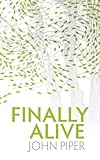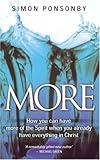
Finally Alive is yet another recent publication from prolific pastor/author John Piper. Not only is he prolific, but passionate. In all his writing there is an intense seriousness and earnestness. Don’t expect a book of jokes to liven up your sermons from Piper any time soon!
In this book he seeks to explain the doctrine of the new birth, or regeneration. What does it mean to be born again? Piper notes that recent Barna research claims that born again Christians are not living any differently from the world. He takes issue with his use of the phrase “born again”. He contends that the New Testament has absolute certainty that the new birth radically changes people. If we are not changed, what evidence is there that we have new life? The book is broken into five major sections. I will summarise his argument briefly, before giving some concluding thoughts:
What is the new birth?
The new birth is God’s work, not ours. It is not the improvement of your old human nature, but the creation of a new human nature. You are still you, but new. The born again are born of “water and Spirit”, signifying the cleansing of the old, and the creation of the new. Because we are still ourselves, cleansing and forgiveness is necessary. But to be transformed, we must also become new.
Why must we be born again?
In short we were dead, spiritually lifeless. This means we love darkness and hate light, we are hard-hearted, cannot submit to God or accept the gospel, we are slaves to sin and slaves of Satan. Repentance is necessary, through which we are awakened to see the ugliness and danger of sin, and the beauty and worth of Christ. In the new birth, we become alive – our faith is awakened, we are justified, we become legal heirs and spiritual children, we love others and enjoy eternal fellowship with God. Because of the new birth, our final perfection is secured. The new birth produces the fight for purity.
How does the new birth come about?
We can’t make it happen – we need the sovereign grace of God. The new birth will happen to all creation, not just to human beings. Our activity in the new birth is faith in Christ, but it is God’s prior act of begetting that causes our believing. We come to faith through hearing and believing intelligible good news.
What are the effects of the new birth?
The book of 1 John gives many evidences of the new birth. We are not perfect, but we walk in the light. The commands of God are not burdensome to us, because we find obedience to them desirable. We overcome the world and this enables us to love God and others. The new birth sets us free from the practise of sinning. For the Christian, we should not allow the presence of ongoing sin to allow us to drift either into complacency or despair. If we are born again, we will love others with the love of God, because love is the nature of God, and our new nature too is to love.
How can we help others be born again?
It is God who opens blind eyes, but he sends us to tell people the gospel. However capable or inadequate we feel for this task, we must remember we are simply jars of clay, the treasure is the gospel. Several practical tips for evangelism are given, including the suggestion of giving away books.
——————
In terms of structure, this is a well put together book. The chapters are short, and broken nicely shorter sections of a few paragraphs with headings. He repeatedly summarises the argument so far and the direction he is going in. All this makes it very accessible even to those who want to read it in just five minute chunks.
As for its message, arguably there could be no more important doctrine for us to understand. It is full of Scripture, and the arguments are plainly presented. The conclusions he draws are hard to argue with, as they so plainly follow from the verses quoted. He makes extensive use of the gospel of John and 1 John.
I hope the legacy of this book will be a clearer understanding of the nature of the new birth. He also tackles the very important issue of how a Christian’s behaviour relates to the new birth. I believe he draws a biblical line of insisting that salvation is all of sovereign grace, that Christians are not yet perfect, but that there will always be evidence of the transforming work of the Spirit in the new birth, because the new birth is a reality, not merely a concept.

